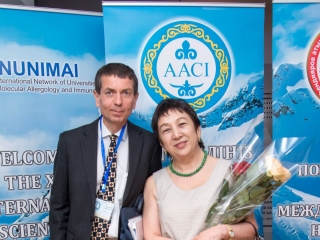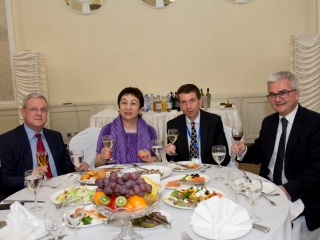Report and photo 2017
XVII National and International Congress “Asthma and Allergy”, a prominent event for the medical society, was held in Almaty at April 25-26, 2017. The event was organized under the support of the Ministry of Health of the Republic of Kazakhstan, S.D.Asfendiyarov Kazakh National Medical University, Republican non-government organization “Association of Allergists and Clinical Immunologists of the Republic of Kazakhstan” and the International University of Molecular Allergology and Immunology (INUNIMAI) headed by Prof. Rudolf Valenta from the Medical University of Vienna.
Acting Rector of S.D. Asfendiyarov KazNMU Prof. M.A. Kamaliyev started the Congress with his greetings, emphasizing the extreme importance of this event.
In his greeting speech, President of the Association of allergists and clinical immunologists, Head of the Department of Allergology and Clinical Immunology of S.D. Asfendiyarov Kazakh National Medical University, Leading pediatric allergist of the Republic of Kazakhstan Prof. Zh. Ispayeva informed guests of the Congress about innovations in allergology and immunology, organization of the conferences from 1998, collaboration with EAACI, and prevalence of allergy in Kazakhstan. According to the official statistics, respiratory diseases take the first place among all diseases in the Republic of Kazakhstan (2.5 million of patients). About 1 million people suffer from bronchial asthma widely spreaded among children. Growth of the prevalence of allergic diseases reaches 10-15 % per year. Therefore, precise diagnostics, correct therapy and prophylaxis are the main issues for clinical medicine.
Brilliant three-hour speech of the President of International Network of Universities of Allergology and Immunology (INUNIMAI) Prof. Rudolf Valenta about molecular allergology and allergen-specific immunotherapy was one of the main events of the Congress.
Prof. Valenta started his speech “Molecular Allergology: From Diagnostics to Therapy, Prognosis and Profylaxis of Allergy” with detailed description of pathogenesis of allergic diseases. Then, he told about the history of recombinant allergen construction and current state of this type of diagnostics. The second part of his speech was devoted to allergen-specific immunotherapy illustrated with his extremely successful developments.
The speech was given in a single burst in a very intelligible way and accompanied by movies about molecular allergology and pathogenesis of allergen-specific immune therapy.
The audience listened to the speech of Prof. Valenta from the Medical University of Vienna with a high interest and admiration. The Congress was broadcasted by the main TV channel of Kazakhstan with the accompaniment of the lecture and interview with Prof. Valenta. Allergologists from Kazakhstan as well as from neighboring countries (Russia, Georgia) and Europe (Germany, Poland, Great Britain) admired a lot from Prof. Valenta speech.
The speech was ended by Prof. Valenta own views to the perspectives of this branch of science. He puts high hopes on molecular diagnostics and therapy of future allergic diseases.
Professionals with narrow specialization and deep experience in allergy and pathologic genetic pathways of allergic rhinitis were the main audience of Prof. Valenta speech. His colossal experience, professionalism and charisma made the speech about molecular diagnostics extremely involving and useful even for the Congress participants, familiar with the subject.
Prof. Valenta speech undoubtedly set the tone for the event and partially even the level of the following speeches. Each speech was based on practical experience of speakers and had research and applied components.
Leading professors, experts of international programs, speakers from Poland (A. Fal), Great Britain (L. Yates), Germany (D. Lecsheyd), Georgia (Maya Gotua), Russia (N. Nenasheva, M, Tkachenko, Ye. Radtsyg) and Kazakhstan (Prof. Zh. Ispaeva, G. Batpenova, E. Kovzel, G. Tusupbekova, M. Gazalieva, Z. Khairullin) made speeches at the Congress highlighting all sides of applied allergology and clinical immunology. Lectures on atopic dermatitis, bronchial asthma, allergic rhinitis, gastrointestinal allergy, antihistamine drugs, education in universities and perspectives of allergy therapy (extremely important for applied healthcare) were made during the Congress.
The universality of the Congress “Asthma and Allergy” program allowed participation of the broad audience of medical professionals including allergists, pulmonologists, dermatologists, gastroenterologists, pediatricians, therapists and general practitioners.
Each Congress speech caused lively discussion in the audience showing high interest among Kazakh doctors to such relatively new branches of medical science as allergology and immunology. At the same time, such interest demonstrates the eagerness of medical professionals to receive new knowledge and exchange their experience, especially with the world leading researchers.
The possibility to tap to international experience and discuss main professional issues always means a lot for Kazakh medicine.
At the end of the Congress, Prof. Valenta summarized the results of the young scientists’ poster session with the awards for the best poster presentations for the maximal stimuli of the progress of allergology and immunology in the Republic of Kazakhstan.
All Congress participators received certificates personally signed by the President of the International Network of the Universities in Molecular Allergology and Immunology Prof. Rudolf Valenta.

